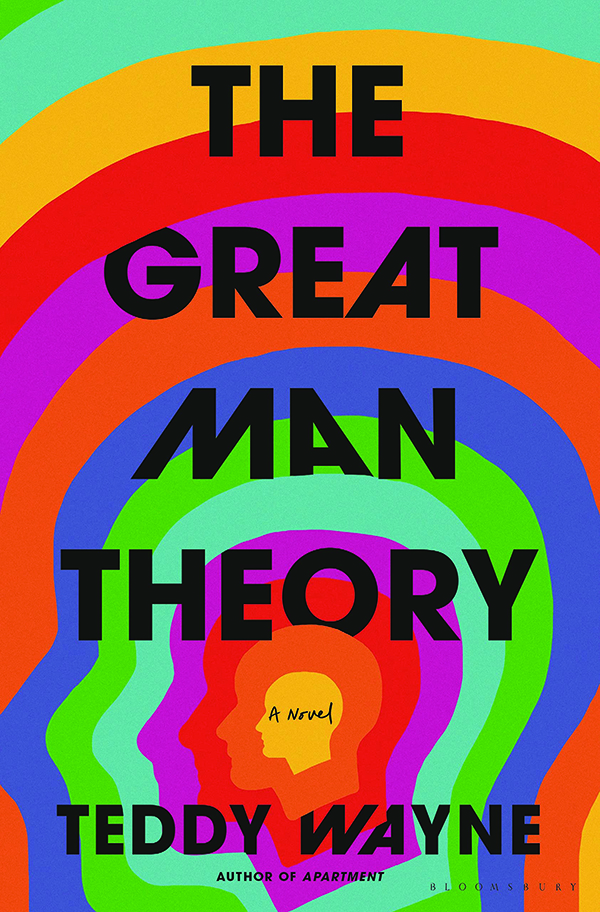In his well-received third novel, 2016’s Loner, Teddy Wayne put readers inside the mind of an awkward male college student who develops a disturbing obsession with a female classmate. His 2020 follow-up, Apartment, was about a shy aspiring writer driven to jealousy by his more talented friend. Wayne is a bard of male failure, insecurity, and resentment; unsurprisingly, the protagonist of his compelling new novel, The Great Man Theory, is not, in fact, a great man.

No, our antihero is someone for whom life hasn’t exactly worked out. Paul is a crotchety writer with no reputation to speak of and few worldly markers of prosperity. He spends his time hovering at the margins of a Brooklyn bourgeoisie personified by his more successful peers. His day job, as an adjunct at a local college, has recently been subject to a humiliating demotion. He can no longer afford his rent in South Slope, a neighborhood he chose in order to be close to his preteen daughter, Mabel. He is touchingly desperate for her approval, yet she prefers to spend her time with his ex-wife and her new husband at their expensive brownstone in the more fashionable Park Slope.
A bane of dinner parties, Paul is a pedant and a bit of a prig. His tactless remarks suck the air out of conversations, and his tendency to launch into left-wing political rants alienates even his liberal acquaintances. He’s a proud technophobe working on a dyspeptic book, The Luddite Manifesto, that he believes will not only make his reputation but rally readers against what he sees as the dumbed-down culture and smartphone-driven ADHD of Trump-era America. Everywhere he sees barbarians at the gate. The college where he teaches a freshman comp course forces him to assign a reading curriculum of BuzzFeed-style personal essays — “I Broke Up with My Toxic Boyfriend and It Was the Best Thing I Ever Did,” “My Family Bodyshamed Me at Thanksgiving. I Had the PERFECT Response” — so asinine that they insult even his crushingly apathetic students.
Meanwhile, Paul keeps tumbling down a hole. He loses his health insurance; his daughter grows distant; he puts foot in mouth at every conceivable opportunity. To save money, he moves into his mother’s apartment in the Bronx, where he is disturbed to learn that she’s become a loyal viewer of an unnamed right-wing cable network the “malevolent twaddle” of which he considers a poison in the American bloodstream. The more humiliations Paul suffers, the more the world makes him feel insignificant, the more he convinces himself that society is diseased and he alone possesses the cure. In his screeds about tablet computers and clickbait and declining attention spans, Paul is really raging at his fear that his daughter, his “little dumpling,” will outgrow her innocence and, in turn, her lame father. But he’s not introspective enough to realize that.
Despite his best efforts, Paul also becomes more entangled with the shallow, tech-saturated culture he loathes. He becomes addicted to commenting on a liberal news site, hungry for the dopamine rushes he gets when other posters like his comments. He develops an Adderall habit. Desperate for income, he starts driving at night for an Uber-style ride-hailing app. One day, he picks up a female passenger who turns out to be a producer at the right-wing cable network. In a manipulative effort to get closer to the source of his hatred, he starts dating her. Now, we have something like a Travis Bickle for the 2010s — cruising the streets, ranting about society’s pathologies, fixated on the idea that with one big, dangerous, attention-seeking act he can save the world and himself.
Wayne is a gifted writer with a talent for deft sketching. A fit, affluent Park Slope father has “a Tom Cruisian compactness.” Paul’s aged mother lives in an apartment building with “Nixon-era decor” and a “carpeted hallway that inexplicably smelled of roast beef.” Wayne is also a canny mimic of the dialogue of the liberal chattering classes, whose conversations are limited to three invariable topics: real estate, the unnamed right-wing populist who has recently assumed the Oval Office, and streaming television.
Wayne isn’t quite a satirist. I think his project is more earnest than that. But his scenes of bourgeois socializing have their own kind of mercilessness: “The Times gave it a mixed review,” a character says, of a new show about a serial killer. “Is it actually good?”
One of Wayne’s other strengths is capturing thought on the page — the ways in which we flatter ourselves, or overanalyze, or rationalize even as we brush aside our knowledge that we’re rationalizing. “Forget them all,” Paul reflects. “He was a writer, a lone wolf, no conforming institutionalist or timid company man. He wasn’t made to operate in their exploitative systems. His wits, and The Luddite Manifesto, would save him.”
The novel’s plotting is tight, meticulous, perhaps even slightly too neat, and there are some parts, particularly the subplot about Paul’s relationship with the cable news producer, where Wayne slightly stretched my suspension of disbelief, though hardly enough to affect my enjoyment of the book. The Great Man Theory, like Wayne’s other work, has a terse, cumulative pace. Despite the emphasis on interiority, and the general mundanity of our protagonist’s life, things move quickly. The reader bounces between the brisk chapters, sometimes as short as a paragraph, propelled along by the suspicion that with someone as volatile and frustrated as Paul, an eruption must surely be coming.
J. Oliver Conroy’s writing has been published in the Guardian, New York magazine, the Spectator, the New Criterion, and other publications.
